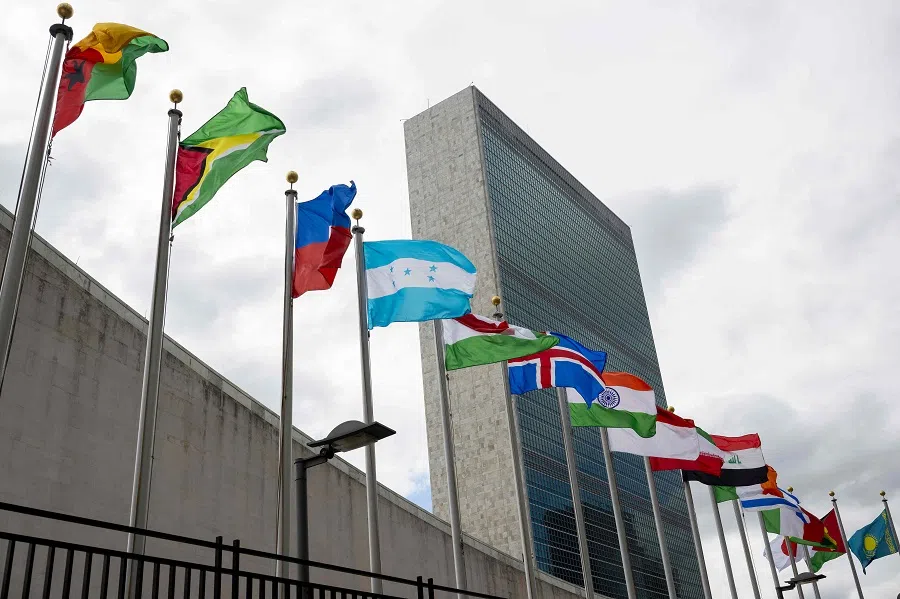UN Resolution 2758 debate: A growing global effort to challenge China’s claims on Taiwan?
Academic Hao Nan thinks that the ongoing manipulation of Resolution 2758 has resulted in a complex geopolitical chess game, with China firmly upholding the “one China” principle, and pro-Taiwan independence forces, backed by Western powers, seeking to shift global perceptions.

Recent moves by Australia and the Netherlands have reignited the debate over Taiwan’s status and the interpretation of UN Resolution 2758. Both countries’ parliaments recently passed motions declaring that the resolution does not pertain to Taiwan as interpreted by Beijing, signalling a growing international effort to challenge China’s claims.
Meanwhile, in Taiwan, several Democratic Progressive Party (DPP) legislators proposed a bill on 18 September, urging the Legislative Yuan to publicly declare that Resolution 2758 does not concern Taiwan’s sovereignty or international status. The proposal calls for bipartisan support to reject what they describe as China’s manipulation of historical facts, further straining cross-strait relations at a precarious time.
... the resolution does not explicitly address Taiwan’s sovereignty; it is primarily concerned with the rightful representation of China in the UN, not a redefinition of territorial boundaries.
Treating Taiwan as independent actor in international affairs
Resolution 2758’s language is clear: it restored the People’s Republic of China (PRC)’s seat in the UN and expelled Taiwan’s representatives. It established the PRC as the only legitimate government of China within the UN, a decision that reaffirmed China’s sovereignty and placed the PRC as one of the five permanent members of the UN Security Council.
Contrary to claims made by pro-independence forces, the resolution does not explicitly address Taiwan’s sovereignty; it is primarily concerned with the rightful representation of China in the UN, not a redefinition of territorial boundaries. This distinction is crucial, yet frequently overlooked by those seeking to challenge the resolution’s legal and political standing.
In Taiwan, particularly among pro-independence factions like the DPP, Resolution 2758 is often weaponised. They argue that because the resolution does not mention Taiwan by name, Taiwan’s status remains undetermined. This narrative has been politically expedient for the DPP, bolstering its stance against reunification with China and swaying domestic public opinion toward viewing Taiwan as a separate entity. This manipulation is a potent tool in local elections and a means to secure international sympathy, especially among Western partners.
Internationally, the US and its allies have seized upon this ambiguity to challenge China’s sovereignty claims over Taiwan. Despite the UN’s consistent adherence to the “one China” policy, recent US congressional resolutions and diplomatic statements imply that Taiwan’s status is still open for debate. Australia and the Netherlands’ recent parliamentary motions add to this international pressure, casting Resolution 2758 in a light that questions its implications for Taiwan.
These actions not only undermine the spirit of Resolution 2758 but also escalate tensions by suggesting that Taiwan could be treated as an independent actor in international affairs, complicating already fraught relations across the Taiwan Strait.
However, this ongoing battle over Resolution 2758 extends beyond legal texts and diplomatic statements — it is a contest of political will.
Whether Taiwan’s sovereignty fully settled
The legal debate over Taiwan’s status often centres on the theory of the “rump state”. After 1949, Taiwan was seen as a remnant government of the Republic of China, having lost control over the mainland, the majority of its territory. The remnant status does not automatically grant it legitimacy to represent China on the global stage, as international law generally recognises the principle of effective control, which means that the legitimacy to represent a state internationally is often tied to the government that controls the majority of its territory and population — a position reinforced by Resolution 2758.
However, pro-independence supporters ignore this interpretation, instead promoting the idea that Taiwan’s sovereignty was never fully settled, citing the 1951 San Francisco Peace Treaty, which omitted explicit recognition of Taiwan’s ownership. This selective reading distorts historical agreements such as the Cairo Declaration and Potsdam Proclamation, which affirmed Taiwan’s return to China.

The ongoing manipulation of Resolution 2758 by pro-independence forces and their international backers reveals a broader strategy of legal and public opinion warfare. For instance, the US employs what can be described as “legal loopholes” to cast doubt on the resolution’s authority, creating a narrative of Taiwan’s undetermined status to rally international support. This has resulted in a complex geopolitical chess game, with China on one side firmly upholding the “one China” principle, and pro-Taiwan independence forces, backed by Western powers, on the other side seeking to shift global perceptions.
In response, China has doubled down on its diplomatic and legal strategies to reaffirm the significance of Resolution 2758. China consistently emphasises the resolution in international forums, using it as a cornerstone to deny Taiwan’s participation in international organisations under the guise of statehood. Through diplomatic pressure and economic incentives, such as those seen in the Belt and Road Initiative, China has reinforced its stance, securing support from numerous countries that align with its interpretation of the resolution.
A battle of wills
However, this ongoing battle over Resolution 2758 extends beyond legal texts and diplomatic statements — it is a contest of political will. The growing militarisation around the Taiwan Strait, coupled with increased US naval patrols and arms sales to Taiwan, exemplifies the shifting dynamics that could spiral into conflict.
Resolution 2758 is not merely a relic of Cold War diplomacy — it remains a vital document defining the contemporary “one China” policy.
As China is navigating these perilous waters amid its rivalry with the US, it has been not only uploading its legal claims and international advocacy to counteract misinterpretations, but also leveraging its strategic and military alignment with Russia in deterring the US and allied support to Taiwan. At the same time, the international community might further divide along this line, further complicating the already divisive alignments with China and Russia on one side, and the US and its allies on the other.
The Taiwan issue has emerged to be one of the most volatile flashpoints in international relations today, and Resolution 2758 stands at the heart of this debate. Resolution 2758 is not merely a relic of Cold War diplomacy — it remains a vital document defining the contemporary “one China” policy.
Misinterpretations of the resolution by pro-independence factions and international actors serve only to deepen the divide, potentially setting the stage for greater conflict. As geopolitical tensions mount, a renewed commitment to factual accuracy and respect for established international agreements is essential to maintaining peace and stability in the region.



![[Big read] When the Arctic opens, what happens to Singapore?](https://cassette.sphdigital.com.sg/image/thinkchina/da65edebca34645c711c55e83e9877109b3c53847ebb1305573974651df1d13a)
![[Video] George Yeo: America’s deep pain — and why China won’t colonise](https://cassette.sphdigital.com.sg/image/thinkchina/15083e45d96c12390bdea6af2daf19fd9fcd875aa44a0f92796f34e3dad561cc)
